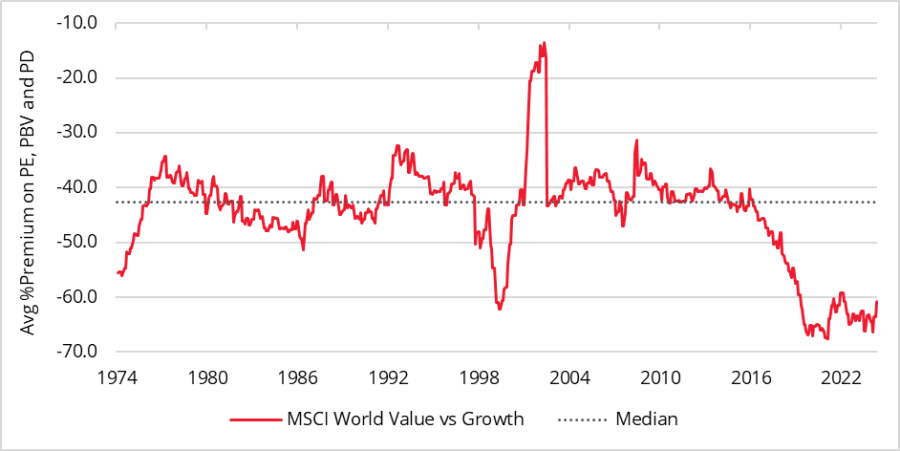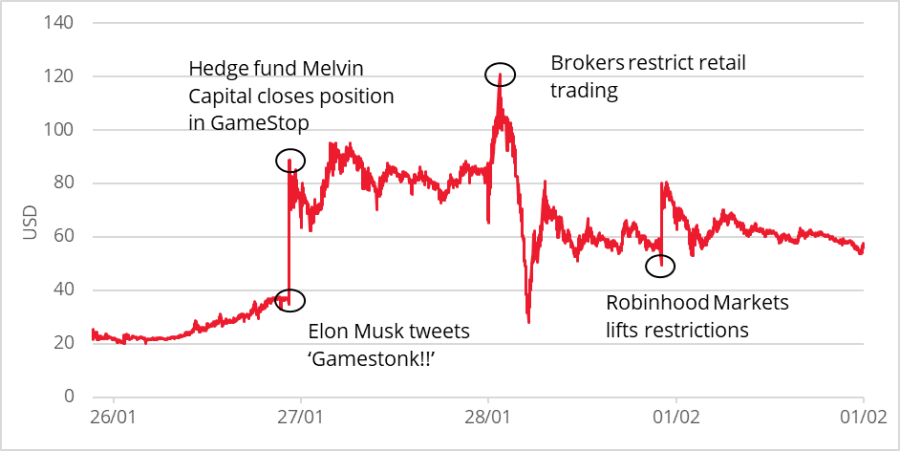The gap between the cheapest and most expensive stocks is close to its widest level for 50 years. While passive investing and pod shops have played significant roles in this market distortion, there's a third force reshaping markets: the rapid growth of retail day trading.
This retail trading revolution epitomised by platforms like Robinhood and the Reddit WallStreetBets phenomenon, represents a fundamental transformation in market microstructure that extends far beyond cyclical increases in retail participation.
MSCI World value vs growth, average valuation premium

Source: Morgan Stanley, 30 April 2025.
The scale of the shift
Day trading in the US stock market has seen a significant increase in recent years, particularly during the Covid-19 pandemic. By 2021, retail investors comprised 25% of total equities trading volume, nearly double the percentage reported a decade prior. This transformation occurred with remarkable velocity and shows no signs of reversing.
The WallStreetBets community exemplifies this new breed of investor. Founded in 2012, this Reddit forum celebrates unconventional investment approaches such as "diamond hands" (holding through extreme volatility) and "YOLO" (you only live once), strategies that can significantly impact stock prices and cause substantial market disruptions.
The concentration effect within this expansion reveals critical insights. Nvidia alone has attracted nearly $4bn in daily retail trading volume, representing 13.4% of all retail dollars traded despite being the most popular stock by value for only 64% of trading days.
Tesla's previous capture of nearly 30% of all retail value traded in February 2023 provides comparative context, having maintained distinction as the most traded retail stock for 678 days (48% of the period) since January 2019, averaging 8.6% of retail dollar volume daily.
Several factors have contributed to this trend. Commission-free trading platforms have lowered barriers to entry, while pandemic-driven market volatility has attracted traders seeking rapid profits.
Government stimulus checks provided extra funds and social media platforms like Reddit's WallStreetBets have encouraged retail participation through coordinated campaigns. The rise of algorithmic trading and advanced trading tools has also made day trading more appealing and accessible.
This structural shift has materially impacted corporate valuations through concentrated flows, algorithmic amplification and the emergence of non-fundamental price drivers that challenge traditional arbitrage mechanisms.
The GameStop inflection point
The GameStop episode of January 2021 exposed the power of coordinated retail activity to overwhelm institutional safeguards. On 27 January, GameStop opened 143% above its previous close and then climbed, closing 10% above its opening price.
The following day saw even greater volatility: the stock opened down 25%, rallied 82% in 30 minutes, plummeted 77% hours later, then jumped 150% before closing 25% off its open.
This extreme volatility culminated with the highly respected hedge fund Melvin Capital requiring a $2.75bn bailout from Citadel and Point72 following losses from its GameStop short position.
This wasn't just individual security volatility – it represented changes in price discovery that have lasting implications for market structure.
GameStop price action, 26 January – 1 February 2021

Source: Bloomberg. GameStop conducted a 4:1stock split in July 2022.
The impact on long-term fundamental value investors
Like pod shops, retails traders now represent a sizeable amount of daily liquidity and tend to concentrate their bets into the same stocks. This creates a huge impact on share prices.
Their focus is momentum and trend, not whether a company is cheap or expensive relative to intrinsic worth.
Crucially, these traders are investing without any informed view of the underlying value or fundamentals, which means that share prices can move both far above and far below the intrinsic business value.
This presents both challenges and opportunities for long-term value investors. A stock that has been bought at what appeared to be a very low valuation can be driven even lower by retail traders who are mostly focused on price momentum.
This can lead to short-term volatility, which is uncomfortable for investors, but can also create opportunities for greater long-run returns as share prices may be driven even further below the intrinsic value of the business.
The opportunity for patient capital
When combined with passive investing's growth and pod shop influence, we're witnessing unprecedented concentration of capital in strategies completely indifferent to valuation.
For long-term investors, this environment may prove rewarding. Any change to market structure that creates security mispricing should increase the opportunity set for those whose investment approach is based on long-term fundamentals and valuation.
Ian Lance is a partner and fund manager in the Redwheel value & income team. The views expressed above should not be taken as investment advice.





